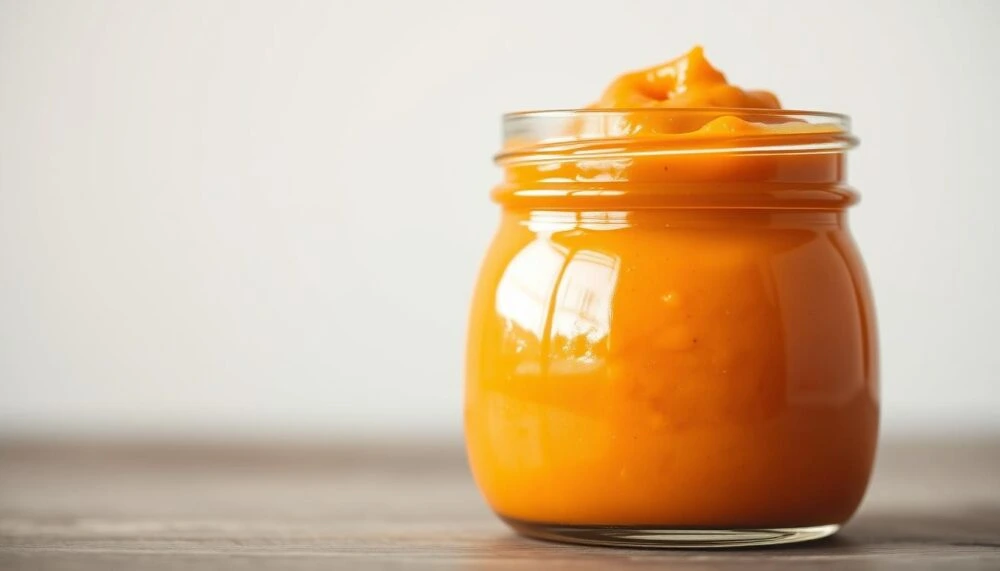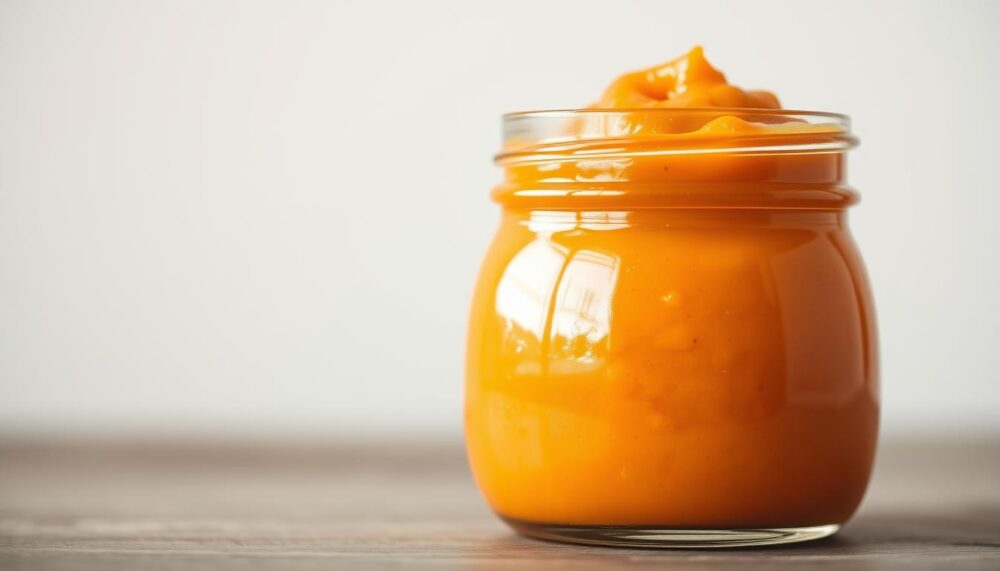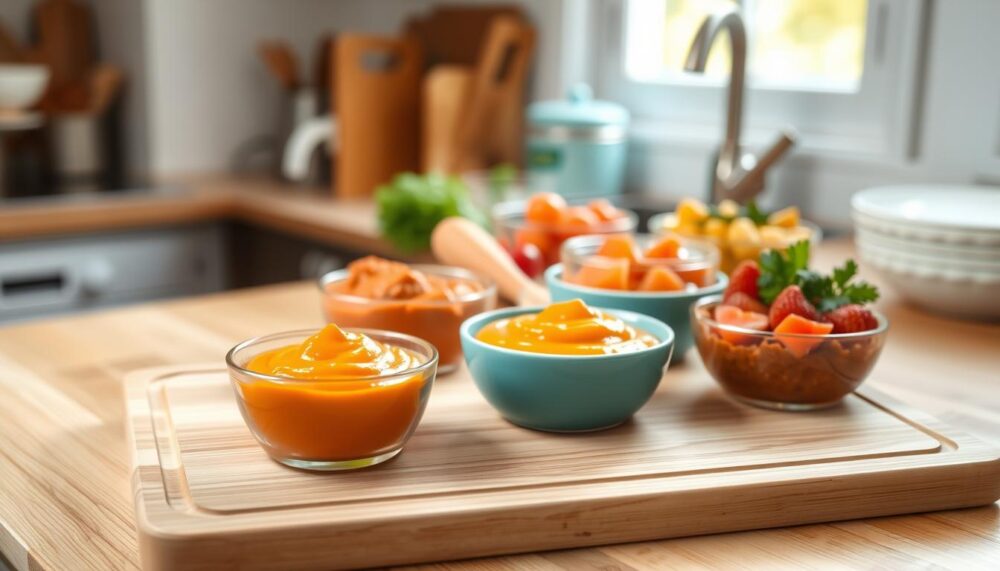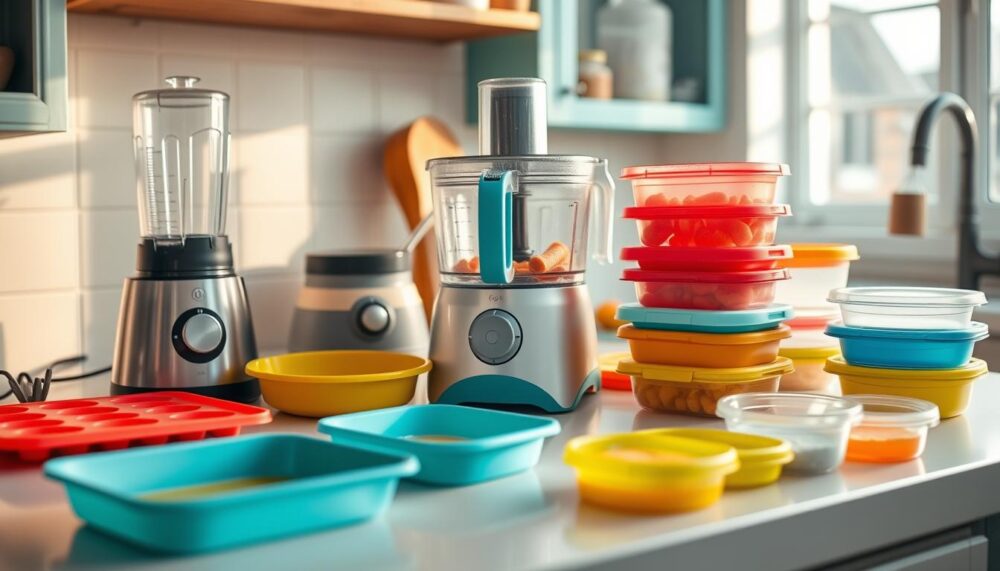
As a parent, I know how vital it is to feed my baby well. Carrots are packed with vitamins and minerals, perfect for baby food. Making baby food carrots at home lets me pick the best ingredients.

Creating baby food carrots is easy and fulfilling. It helps my baby start life with a healthy diet. I’ll guide you through making a tasty and nutritious baby food carrot puree. You’ll learn the benefits of homemade baby food and why using fresh ingredients is key.
Key Takeaways
- Learning how to make baby food carrots can provide my baby with the necessary nutrients for growth and development
- Making baby food carrot puree at home allows me to control the ingredients and ensure the highest quality
- Carrots are an excellent source of vitamins and minerals, making them an ideal ingredient for baby food
- Making baby food carrots is a simple and rewarding process
- Using fresh and high-quality ingredients is critical for healthy baby food
- Homemade baby food ensures my baby gets the best nutrition
Why Choose Homemade Carrot Baby Food
Introducing solid foods to your baby can be scary. There are many options, but homemade baby food has its perks. Carrots are great for babies because they’re full of vitamins and fiber.
Homemade carrot baby food lets you pick the best ingredients. Using fresh, organic carrots means your baby gets the best start. Plus, you avoid preservatives and additives found in store-bought foods.
Nutritional Benefits of Carrots for Babies
Carrots are packed with vitamin A, which is key for healthy eyes and immune system. They also have fiber, which helps with digestion.
Cost Comparison: Homemade vs. Store-bought
Homemade baby food can save you money. Buying carrots in bulk and making your own saves more than store-bought options. Here’s a comparison:
- Homemade carrot baby food: $0.50 per serving
- Store-bought carrot baby food: $1.50 per serving

Quality Control Benefits
Homemade baby food means you can choose fresh, high-quality ingredients. This gives you peace of mind about your baby’s nutrition. You can also adjust recipes to fit your baby’s tastes and needs.
Essential Equipment for Making Baby Food Carrots
To make easy homemade baby food, you need the right tools. As a parent, I want to make sure my baby’s food is safe and easy to make. For baby food carrots, you’ll need a few key items.
A food processor is great for pureeing carrots into a smooth mix. A steamer helps cook carrots without losing nutrients. You’ll also need storage containers to keep the food fresh.
Here are some other must-haves:
- A blender or hand blender for mixing and pureeing
- A strainer or sieve for removing any lumps or solids
- A set of ice cube trays for freezing individual portions
- A baby food maker or cooker for simplifying the cooking process

When picking out equipment, think about how easy it is to use and clean. Look for dishwasher-safe items with simple designs. This way, you can make healthy meals for your baby easily.
Selecting the Best Carrots for Baby Food
Choosing the right ingredients is key when making organic baby food. For carrot baby food, picking the best carrots is vital. Opt for organic carrots to avoid pesticides and harmful chemicals.
It’s also important to choose fresh carrots. Fresh carrots are brighter, firmer, and sweeter. Look for vibrant orange carrots with a slight sheen. Avoid wilted or soft carrots with mold or rot.
Key Characteristics of Fresh Carrots
- Bright orange color
- Firm texture
- Sweet taste
- Free of visible signs of mold or rot
The best carrot varieties for baby food are Nantes and Danver. They are sweet, tender, and easy to digest. By picking the right carrots and following proper preparation, you can make healthy and tasty carrot baby food.
Preparing Carrots for Baby Food Processing
To make healthy baby food, it’s key to prepare carrots right. First, I wash them in cold water to get rid of dirt. This makes sure they’re clean and ready to go.
Then, I peel the carrots with a vegetable peeler. This step is important to avoid choking hazards and digestive problems. I also take out any seeds or spots on the carrots.
Here are the main steps to prepare carrots for baby food:
- Wash the carrots in cold water to remove dirt and debris
- Peel the carrots using a vegetable peeler
- Remove any stems, leaves, seeds, or blemishes
- Chop the carrots into small, manageable pieces
Using fresh and clean ingredients is very important for baby food. It keeps the food safe and full of good nutrients. As a parent, it’s reassuring to know I’m giving my baby the best food, made with love and care.
How to Make Baby Food Carrots: Step-by-Step Process
To make tasty and healthy baby food carrots, follow a simple process. First, wash and peel the carrots. Then, cut and cook them. Lastly, puree the mix until it’s smooth. This ensures your baby gets a puree that’s easy to digest.
Start by washing the carrots in cold water. This removes dirt, bacteria, and pesticides. Next, use a vegetable peeler to remove the tough skin.
Washing and Peeling
This step is key to keeping the carrots clean and safe. After peeling, cut the carrots into small pieces. Cook them in a steamer or boiling water until tender.
Cutting and Cooking
Cooking the carrots makes them easier to puree and digest. Let them cool before blending them in a blender or food processor.
Pureeing Techniques
When pureeing, add a bit of water or breast milk for the right consistency. Taste the puree and adjust the seasoning if needed. By following these steps, you can make a nutritious and tasty meal for your baby.
Achieving the Perfect Consistency
Making baby food carrot puree needs the right consistency. You want your baby’s food to be easy to eat and digest. Adjusting the puree’s consistency is key. You can do this with homemade baby food recipes that let you control the texture.
Here are some tips for the perfect consistency:
- Start with a single-ingredient puree, like carrot puree, and add other ingredients to get the right texture.
- Blend the carrots until smooth with a blender or food processor.
- Add water or breast milk to thin out the puree if it’s too thick.
- Use a spoon to check the puree’s consistency. If it’s too thin, add more carrot puree. If too thick, add water or breast milk.
By following these tips, you can make a baby food carrot puree that’s tasty and easy to eat. Always use homemade baby food recipes that fit your baby’s needs and tastes.
| Consistency | Description |
|---|---|
| Thin | Easy to feed, but may be too runny for some babies. |
| Thick | May be too thick for some babies, but can be thinned out with water or breast milk. |
| Perfect | Just right for feeding, easy to digest, and suitable for most babies. |
Storage Guidelines for Homemade Carrot Baby Food
As a parent, keeping your easy homemade baby food fresh is key. Storing homemade carrot baby food right is important. It helps keep the food fresh and safe for your baby. Follow these simple tips to enjoy your organic baby food recipes and keep your baby healthy.
To keep your homemade carrot baby food fresh, store it in the fridge for up to three days. Or, freeze it for up to three months. Here are some tips to remember:
Refrigeration Tips
- Store the baby food in airtight containers to prevent contamination and spoilage.
- Label the containers with the date and contents to ensure you use the oldest food first.
- Keep the containers in the refrigerator at a temperature of 40°F (4°C) or below.
Freezing Methods
- Use ice cube trays to freeze the baby food in small portions, making it easy to thaw and serve.
- Transfer the frozen cubes to airtight containers or freezer bags for longer storage.
- Label the containers or bags with the date and contents to ensure you use the oldest food first.
Signs of Spoilage
Always check your homemade carrot baby food for signs of spoilage before serving it to your baby. If you notice any off smells, slimy texture, or mold, discard the food immediately. This ensures your baby’s safety.
When and How to Introduce Carrots to Your Baby
Introducing healthy foods to your baby can be challenging. It’s important to know when to start carrots. The American Academy of Pediatrics suggests starting solid foods, like carrots, at six months. This is a great time for your baby to try new tastes and textures.
When you start carrots, start with a small amount. Try one to two teaspoons first. You can mix carrots with other foods like sweet potatoes or peas for a tasty meal.
Age Recommendations
Babies are usually ready for solid foods, including carrots, at six months. But, every baby is different. Watch for signs like good head control, sitting up, and interest in food.
Signs of Readiness
Here are some signs your baby might be ready for solid foods:
- Showing interest in food
- Good head and neck control
- Sitting up with support
- Loss of “tongue-thrust” reflex
By following these tips and considering your baby’s needs, you can introduce carrots and other healthy foods successfully.
Common Mistakes to Avoid When Making Carrot Baby Food
Learning how to make baby food carrots is important. You must avoid common mistakes that can harm the quality and safety of the food. One big error is using old or low-quality carrots. This can make the pureed carrots less nutritious for babies. Always pick fresh, organic carrots and store them well to keep their nutrients.
Another mistake is cooking the carrots too long or too short. This can make the texture bad and lose important nutrients. To get the right texture, cook the carrots until they’re soft. Then, puree them with a food processor or blender. Here are some tips to remember:
- Use a gentle cooking method, such as steaming, to keep the carrots’ natural flavor and nutrients.
- Avoid adding too much water, as it can make the puree less nutritious.
- Don’t over-process the carrots, as it can make them too smooth and unappealing.
By following these tips and avoiding common mistakes, you can make healthy and tasty pureed carrots for babies. Always focus on food safety and handling when making baby food carrots. If you have any concerns, talk to your pediatrician.
Creating Carrot Food Combinations
As a parent, it’s key to mix different flavors and nutrients in your baby’s diet. You can do this by combining baby food carrot puree with other foods. This way, you can make meals exciting and full of nutrients. Try mixing carrots with veggies, fruits, or proteins to create tasty and healthy dishes.
Safe pairings for carrot baby food include peas and carrots, carrots and apples, or carrots and chicken. These combos add variety and essential vitamins and minerals. For instance, peas are high in protein and fiber, while apples add sweetness and antioxidants. Always introduce new foods one at a time to watch for any allergies.
Flavor Enhancement Tips
To make your baby food carrot puree taste better, add a pinch of cinnamon or a squeeze of fresh lemon juice. These add a sweet and bright taste without hiding the carrot’s natural flavor. Try roasting or steaming carrots to enhance their sweetness. By using these methods, you can make healthy and tasty meals for your baby.
- Carrot and sweet potato puree
- Carrot and zucchini mash
- Carrot and chicken stew
Always put your baby’s safety and health first when trying new foods. Talk to your pediatrician before making big changes to your baby’s diet.
| Carrot Food Combination | Ingredients | Nutritional Benefits |
|---|---|---|
| Carrot and Pea Puree | Carrots, peas, breast milk or formula | Rich in vitamin A, protein, and fiber |
| Carrot and Apple Mash | Carrots, apples, cinnamon | High in antioxidants, fiber, and vitamin A |
Safety and Allergen Considerations
When making easy homemade baby food, safety and allergens are key. It’s important to handle and store food properly to avoid contamination. Always wash your hands before touching food. Make sure all utensils and tools are clean and sanitized.
Carrots are often safe for babies, but it’s wise to introduce them slowly. Start with a small amount to watch for any signs of allergy. Signs include rash, itching, or swelling. If you see these, call your pediatrician right away.
Here are some tips for introducing carrots safely:
- Start with a small amount (about 1-2 teaspoons) and gradually increase the serving size
- Monitor your baby’s reaction for 2-3 days before introducing another new food
- Choose organic baby food recipes that are free from common allergens like nuts, dairy, and soy
By following these steps, you can make sure your baby’s first taste of easy homemade baby food is safe. Always put your baby’s health first. If you’re worried about food allergies or intolerances, talk to your pediatrician.
Conclusion
Making homemade carrot baby food is rewarding. It gives your baby the best nutrition and teaches them to love healthy foods. At first, it might seem hard to make baby food carrots. But with some practice, you’ll get the hang of it.
Choosing fresh, organic carrots is key. It ensures your baby gets the best nutrition. Also, remember to store and prepare the food safely. This way, you’ll keep your baby healthy and happy.
Start this cooking journey with excitement. Homemade carrot baby food is a great choice. Seeing your baby enjoy their food is priceless. It’s all worth it for their health and happiness.
FAQ
What are the benefits of making homemade carrot baby food?
Making homemade carrot baby food has many advantages. You can pick the ingredients and ensure they are top quality. Carrots are packed with vitamins and minerals, making them great for baby food.
What equipment do I need to make baby food carrots?
To make baby food carrots, you’ll need a food processor, steamer, and containers for storage. Choose equipment that’s easy to use and clean. This makes preparing baby food smooth and efficient.
How do I select the best carrots for baby food?
For baby food, pick organic, fresh, and firm carrots. Look for carrots without blemishes and with a bright color. Nantes or Chantenay carrots are good choices for baby food.
What is the step-by-step process for making baby food carrots?
To make baby food carrots, start by washing, peeling, and chopping the carrots. Then, steam or boil them until they’re soft. Use a food processor or blender to puree them until smooth.
How can I achieve the perfect consistency for my baby’s carrot puree?
Getting the right consistency for your baby’s carrot puree is key. You can adjust it by adding more or less liquid. The puree should be smooth and easy to spoon.
How should I store homemade carrot baby food?
Store homemade carrot baby food in the fridge for 3-4 days or in the freezer for 3-4 months. Use airtight containers and label them with the date. This keeps the food fresh and safe for your baby.
When and how should I introduce carrots to my baby?
You can introduce carrots to your baby’s diet around 6 months, after they start eating solids. Start with small amounts and watch for any allergic reactions. Introduce carrots slowly with other foods to help your baby’s digestive system adjust.
What are some common mistakes to avoid when making carrot baby food?
Avoid using old or spoiled carrots and don’t overcook or undercook them. Also, make sure to store the puree properly. Always follow food safety guidelines and avoid cross-contamination.